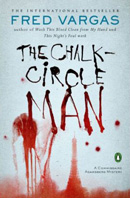
Unusual, unorthodox, and uncanny is how I might sum up the detective we are introduced to in Fred Vargas's first "Commissaire Adamsberg" mystery. And if you are a seasoned reader of detective fiction, this novel—this detective—may cause you to question the very reasons you read in this genre.
The Chalk Circle Man was originally published in the mid-1990s and was translated into English only recently, although subsequent books in the series, bestsellers in Europe, were published in English much earlier. I have not yet read any of the later novels.
In this first book, Jean-Baptiste Adamsburg has just been appointed Commissaire in the Paris police force. He has barely had time to acquaint himself with his co-workers before he becomes intrigued with the appearances of blue chalk circles on sidewalks all over the city. There might be one or two a night, each one encircling a discarded object—a pair of tweezers, a roll of film, a dog turd, a cigarette lighter and so on – around the circle's edge, an inscription, 'Victor, woe's in store, what are you out here for?' It is not long before a dead woman with a slashed throat is found within a circle.
While this sounds like the perfect set-up for the usual sort of police procedural, Vargas turns the whole thing on its head with her introduction of Adamsburg, whom I suspect is the most un-logical and un-rational detective in crime fiction today. The mystery of the novel, which is moderately interesting by itself, really serves to showcase our detective.
Jean Baptiste Adamsberg was born and raised in the Pyrenees, the "edge of the known world." Here is where he entered the police force and where he earned the nickname of "the wild child". This is also where he solved—in a very unorthodox manner—four murders and earned his fame as a detective. Adamsburg is not the rational, deductive reasoner of most crime novels, he's a bit fey or a bit 'zen', as a friend of mine prefers to describe him. He has a casual manner, and everything is slow and measured with him. He does things gently with a kind of grace and speaks with a soft voice which has a calming effect on people. Adamsberg has little regard for time or appearance and often misses appointments and or shows up with his shirts buttoned wrongly or a tie haphazardly fastened around his neck. He has no deductive reasoning and doesn't bother to organize his thoughts - rather he waits for thoughts to come to him. He doodles and scribbles constantly. And what is more unsettling is that Adamsberg has some foreknowledge and also a kind of heightened awareness of some things—such as cruelty lurking behind a person's polished, polite exterior.
It's a bit of a fantasy to have such an unorthodox and undisciplined person in a position of oversight. In real life, such positions require the very qualities that Adamsberg lacks. Still, Vargas makes this work by giving Adamsberg a conventional crime-fighting team, especially Inspector Adrien Danglard, a single father of five children who drinks too much but is very much an intelligent and rational man.
Vargas writes in a delightful prose—smoothly translated—with a hint of a wry humor. Her characters in this novel are individual and eccentric, and there is great enjoyment in getting to know them. Like in other detective novels, the crime is interesting and more complex than it first appears, but unlike other detective novels, Jean Baptiste Adamsberg is in charge of this investigation.
I'm fond of books which disturb me—which turn my thinking upside down. It can be exhilarating to have your
expectations toyed with, to have to rethink something. In between chapters of The Chalk Circle Man, I
found myself pondering why I read detective fiction. Is it for the interesting characters or the delicious
puzzles presented? Is it for the brainy and sometimes sexy display of clear, deductive reasoning and logical
thinking? Am I looking for absolution for some sense of sin, as W. H. Auden has theorized? Or it is because
I know that a detective story—and especially a police procedural—begins with the chaos of crime
and ends with the world being made right again? I used to know why, and now I'm not so sure. That's the
bewitching effect Jean Baptiste Adamsberg has had on me.

Penguin Books, paperback, 9780143115953
